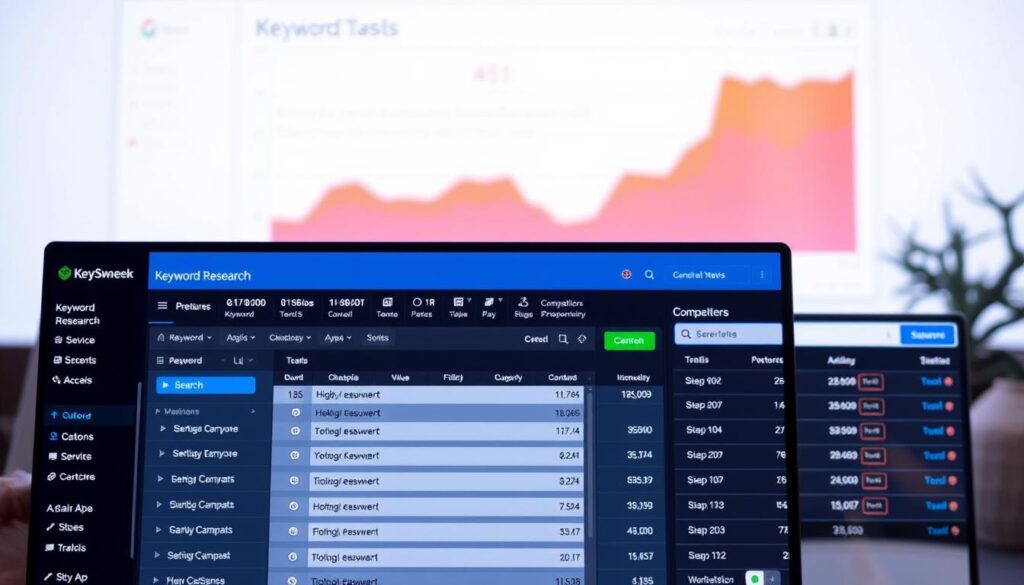As I explore SEO, I see how vital the right keyword research software is. With many choices, knowing what makes a tool great is key. It helps boost my online presence.
I’m looking into the best tools to make my content better. These tools will help me stay on top and improve my site’s ranking.
Key Takeaways
- Understanding the importance of keyword research software in SEO
- Identifying the best tools to optimize content
- Refining SEO strategy with the right tools
- Improving website ranking with effective keyword research
- Staying ahead of the competition with the latest tools
Introduction to Keyword Research
Keyword research is key to my SEO strategy. It shows me what people search for online and how I can match my content to their needs.
Through keyword research, I find out what terms my customers use to find products or services like mine. This info is super helpful for making my website and content better for search engines.
Why Keyword Research Matters
Keyword research is important because it lets me know what my audience talks about. By using the right keywords, I can make content that really speaks to them and meets their needs.
It also helps me stay ahead by finding market gaps and keywords others might miss.
How It Impacts My SEO Strategy
Keyword research directly shapes my SEO plan. Knowing which keywords to aim for, I can make my website’s content, meta tags, and links better for search engines.
It also guides my content creation, helping me make stuff that’s relevant, fun, and full of the right keywords. This brings more people to my site and boosts my online presence.
By using the best keyword research tools and keeping up with trends, I can always make my SEO strategy better and grow my online presence.
Criteria for Choosing a Keyword Research Tool
There are many keyword research tools out there. It’s important to know what to look for. I need to consider a few key factors to make the right choice.
Usability and Interface Design
The design and ease of use of a keyword research tool matter a lot. A tool with an intuitive interface helps me work faster. I look for features like:
- Clear navigation and organization
- Customizable dashboards
- User-friendly search functionality
I also check the quality of customer support and resources like tutorials.
Data Accuracy and Freshness
Data accuracy and freshness are very important. Outdated or incorrect data can harm SEO strategies. I seek tools that:
- Regularly update their databases
- Have a wide range of data
- Offer insights into keyword trends
Tools that use many data sources are usually more accurate.
Additional Features and Integrations
Additional features and integrations can make a tool even better. I look for tools with:
- Competitor analysis
- SERP analysis
- Content optimization suggestions
- Integration with other SEO tools
These features help me work more efficiently and effectively.
Top Free Keyword Research Tools
I’ve found that some of the best keyword research tools are free. They’re perfect for anyone wanting to boost their SEO without spending a lot.
Google Keyword Planner
The Google Keyword Planner is a favorite among SEO experts. It’s mainly for Google Ads, but it’s great for keyword research too. I can find keywords related to my business and see how often they’re searched.
One big plus of Google Keyword Planner is its accurate search volume data. This tells me how often certain keywords are searched. It’s key for my SEO plans.
Ubersuggest
Ubersuggest is another free tool that’s really powerful. It was made by Neil Patel and offers keyword suggestions, search volume, and competitor analysis. I can use it to generate a list of possible keywords and see how competitive they are.
Ubersuggest also helps with content ideas and SEO audits. It’s a versatile tool for my SEO needs.
AnswerThePublic
AnswerThePublic is a special tool that shows what people are searching for online. It lists questions and phrases related to a keyword. This helps me understand user intent and make relevant content.
With AnswerThePublic, I can find long-tail keywords and make content that meets my audience’s needs.
In summary, these free keyword research tools are great for improving my SEO. By using Google Keyword Planner, Ubersuggest, and AnswerThePublic, I can improve my keyword research and make better content.
Popular Paid Keyword Research Tools
To boost my SEO, I’ve started using paid keyword research tools. They offer advanced features and deep data analysis. These tools help me improve my website’s ranking and stay competitive.
SEMrush
SEMrush is a top keyword research software for detailed analysis. It has many tools, like competitor analysis and SEO audits. With SEMrush, I find content gaps and new growth chances.
Ahrefs
Ahrefs has greatly enhanced my keyword research. Its huge database and filters help me find key keywords. It also shows content gaps and suggests improvements.

Moz Pro
Moz Pro is a suite of SEO tools with a strong keyword feature. It helps me find important keywords and track rankings. Moz Pro also checks my website’s authority and suggests ways to improve.
KWFinder
KWFinder is great for finding long-tail keywords. It’s perfect for targeting specific topics and reaching my audience. Its ease and effectiveness make it a key SEO tool for me.
Using these best keyword research tools has sharpened my SEO strategy. It’s improved my website’s visibility and brought more targeted traffic. Each tool brings unique features and insights, helping me pick the best one for my needs and budget.
Exploring Advanced Features
The best keyword research tools do more than just give basic suggestions. They have advanced features that help me improve my SEO strategy. These tools are key to staying ahead and reaching my online marketing goals.
SERP Analysis
SERP analysis lets me see how search engine results pages work for my target keywords. By looking at the top pages, I learn what works and what doesn’t. This helps me tweak my content strategy.
Key benefits of SERP analysis include:
- Understanding the content types that rank well
- Identifying the most common keywords and phrases used by top-ranking pages
- Analyzing the backlink profiles of top-ranking pages
Competitive Research
Competitive research is another advanced feature that keeps me ahead. By studying my competitors’ strengths and weaknesses, I find ways to beat them. This helps me grab more market share.
The key aspects of competitive research include:
- Analyzing competitors’ keyword strategies
- Identifying gaps in their content and link building strategies
- Understanding their technical SEO strengths and weaknesses
Keyword Suggestions and Filters
Advanced keyword research tools also offer detailed keyword suggestions and filters. These tools help me narrow down my keyword lists. I can find long-tail opportunities and focus on keywords that matter most.
Some of the key features of keyword suggestions and filters include:
- Keyword clustering and grouping
- Filtering by keyword difficulty, search volume, and cost-per-click
- Suggestions for related keywords and phrases
Integrating Keyword Tools into My Workflow
To get the most out of my keyword research, I need to use the best tools in my workflow. This makes me more productive and helps my SEO strategy match my team’s goals.
Starting with streamlining my research process is key. I use my chosen tools to make tasks like data analysis and competitor research easier. For example, SEMrush and Ahrefs help with SEO audits and content optimization, saving me time.
Streamlining My Research Process
Using advanced tools automates tasks, keeping me updated on keyword rankings. I can also find relevant keywords and understand the competition better. This helps me make informed decisions.

Many tools also integrate with other SEO platforms. This makes my workflow smoother. For example, linking my keyword tool with project management software helps me track tasks and team progress.
Collaboration with Team Members
Collaboration is vital in SEO, and keyword tools help a lot. They offer features for working together, like multi-user access and sharing reports. This way, my team and I can share insights and track our work better.
In summary, using keyword tools well is key to reaching my SEO goals. By making my research process smoother and working better with my team, I can attract more visitors and improve my online presence.
Tracking Performance and Results
Tracking my keyword performance helps me see where I can get better. I use tools to check how my keywords do in search results.
Measuring Success with Keywords
To see how well my keywords are doing, I look at search volume, competition, and ranking. Free keyword research tools like Google Keyword Planner and Ubersuggest give me the info I need.
Some important things to watch include:
- Keyword ranking positions
- Organic traffic from target keywords
- Conversion rates for keyword-driven content
Adjusting My Strategy Based on Insights
After I get data on my keyword performance, I can tweak my SEO plan. This might mean updating my keyword list, improving current content, or making new content for promising keywords.
A keyword suggestion tool helps me find new keywords and fine-tune my list. Using these insights, I can boost my search rankings and attract more relevant visitors.
Here are some ways to adjust my SEO strategy:
- Refine my keyword list to focus on top performers
- Optimize current content for better keyword fit and density
- Create new content for emerging keyword chances
Conclusion: Choosing the Right Tool for My Needs
Choosing the right keyword research tool is key for my SEO success. With many options, I need to think about what I need, my budget, and my SEO goals. This helps me make a smart choice.
I suggest using Google Keyword Planner, SEMrush, and Ahrefs. These tools are great for finding keywords, analyzing SERPs, and checking competitors. They help me get more online visibility and drive traffic to my site. The keyword planner tool is also very useful for finding the right keywords and phrases.
Recommended Tools and Next Steps
My top picks are a good start for my keyword research. To get the most out of them, I’ll use them in my work, track my progress, and change my strategy as needed. This way, I can improve my SEO and get better results.










